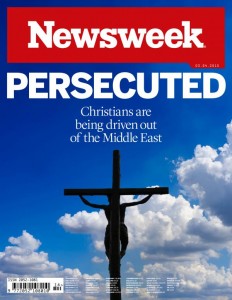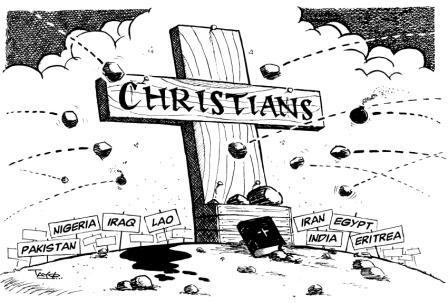I grew up learning different ways how to fortify my faith. Especially on Good Friday, when Christians are invited to kiss the cross of Jesus, I used to experience the beauty behind the sacrifice of the Son of God. However, this year, I was thinking about the increasing number of persecuted Christians in the Middle East who will not be allowed to do any kind of worship.
In the last six weeks I was in the United Kingdom to improve my English skills. I attended an intensive English course with people from several countries and cultures. The enriching period in the UK was my first opportunity to live with Muslims every day. The huge gap between our creeds and behaviours remembered me to never take religious issues for granted. Nevertheless, in spite of the difficulty to understand who thinks (and believes) differently, I saw again that it does not stop anyone from living with a respectful behaviour.
 Flying back home, I read the cover article of Newsweek’s magazine, which talks about the persecution of Christians in the Middle East. Even though it is always difficult to believe in the truth behind American reportages, this article contains some interesting elements.
Flying back home, I read the cover article of Newsweek’s magazine, which talks about the persecution of Christians in the Middle East. Even though it is always difficult to believe in the truth behind American reportages, this article contains some interesting elements.
Firstly, the decreasing number of Christian communities described in Syria, Iraq, Egypt and the Holy Land showed that Christians are struggling to save their faith due to the persecution. Some of them fled to safe countries but many ended up losing their lives in the middle of wars and fights for power between fundamentalist groups and governments. “Some of the oldest Christian communities in the world are disappearing in the very lands where their faith was born and first took root”, says the Center for American progress, interviewed by the author of the article.
Furthermore, the variety of interviews with local people highlights the absence of a “good side” in the conflict. In Syria, Christian communities are being hurt both by the jihadists and the army of Bashar Assad. In addition, the article doesn’t hide the fault of Western countries of this increasing phenomenon. In Iraq, for example, “the latest round of Christian persecution started with the U.S.-led invasion in the 2003 and the sectarian violence that followed”.
Even though I have never summarised Easter in simply exchanging chocolate eggs or eating something special with my relatives, this year I lived this momentous day of Christianity differently. I tried to celebrate the sacrifice of Jesus in memory of my persecuted brothers and sisters in the Middle East. I wish a better future for these communities in order to renew the victory of Love against death.
(Revised by Flavia Ganarin)


